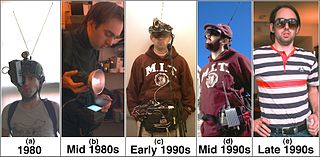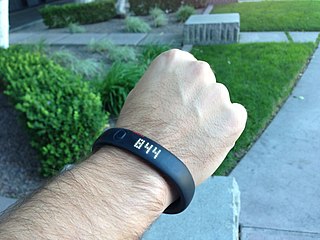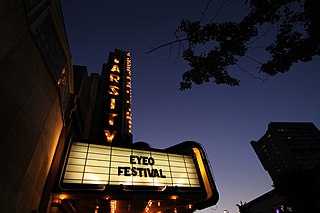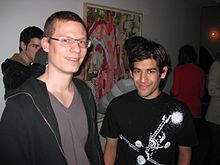The ethics of technology is a sub-field of ethics addressing the ethical questions specific to the Technology Age, the transitional shift in society wherein personal computers and subsequent devices provide for the quick and easy transfer of information. Technology ethics is the application of ethical thinking to the growing concerns of technology as new technologies continue to rise in prominence.

Infographics are graphic visual representations of information, data, or knowledge intended to present information quickly and clearly. They can improve cognition by using graphics to enhance the human visual system's ability to see patterns and trends. Similar pursuits are information visualization, data visualization, statistical graphics, information design, or information architecture. Infographics have evolved in recent years to be for mass communication, and thus are designed with fewer assumptions about the readers' knowledge base than other types of visualizations. Isotypes are an early example of infographics conveying information quickly and easily to the masses.

Motion graphic design, also known as motion design, is a subset of graphic design which combines design with animation and/or filmmaking, video production, and filmic techniques. Examples include kinetic typography and graphics used in film and television opening sequences, and station identification logos of some television channels.

Facebook is a social media and social networking service owned by the American technology conglomerate Meta. Created in 2004 by Mark Zuckerberg with four other Harvard College students and roommates Eduardo Saverin, Andrew McCollum, Dustin Moskovitz, and Chris Hughes, its name derives from the face book directories often given to American university students. Membership was initially limited to Harvard students, gradually expanding to other North American universities. Since 2006, Facebook allows everyone to register from 13 years old, except in the case of a handful of nations, where the age limit is 14 years. As of December 2022, Facebook claimed almost 3 billion monthly active users. As of October 2023, Facebook ranked as the 3rd most visited website in the world, with 22.56% of its traffic coming from the United States. It was the most downloaded mobile app of the 2010s.

A lifelog is a personal record of one's daily life in a varying amount of detail, for a variety of purposes. The record contains a comprehensive dataset of a human's activities. The data could be used to increase knowledge about how people live their lives. In recent years, some lifelog data has been automatically captured by wearable technology or mobile devices. People who keep lifelogs about themselves are known as lifeloggers.
Social network advertising, also known as social media targeting, is a group of terms used to describe forms of online advertising and digital marketing focusing on social networking services. A significant aspect of this type of advertising is that advertisers can take advantage of users' demographic information, psychographics, and other data points to target their ads.

JESS3 is an interactive agency based in Los Angeles, CA, specializing in data visualization, social media strategy, infographics, branding and web design. The firm has worked with clients including Google, Nike, Intel, Facebook, ESPN, and Samsung.

Whitepages is a provider of online directory services, fraud screening, background checks and identity verification for consumers and businesses. It has the largest database available of contact information on US residents.

Quantified self refers both to the cultural phenomenon of self-tracking with technology and to a community of users and makers of self-tracking tools who share an interest in "self-knowledge through numbers". Quantified self practices overlap with the practice of lifelogging and other trends that incorporate technology and data acquisition into daily life, often with the goal of improving physical, mental, and emotional performance. The widespread adoption in recent years of wearable fitness and sleep trackers such as the Fitbit or the Apple Watch, combined with the increased presence of Internet of things in healthcare and in exercise equipment, have made self-tracking accessible to a large segment of the population.
A mobile application or app is a computer program or software application designed to run on a mobile device such as a phone, tablet, or watch. Mobile applications often stand in contrast to desktop applications which are designed to run on desktop computers, and web applications which run in mobile web browsers rather than directly on the mobile device.

Line is a freeware app for instant communications on electronic devices operated by LY Corporation. Line users exchange: texts, images, video and audio and conduct free VoIP conversations and video conferences. In addition, Line is a platform providing various services including: digital wallet as Line Pay, news stream as LINE Today, video on demand as Line TV and digital comic distribution as Line Manga and Line Webtoon.

An activity tracker involves the practice of measuring and collecting data on an individual's physical and psychological activity to keep track and maintain documentation regarding their health and wellness. Used for many groups even animals as seen in collar-mounted activity trackers for dogs. A lot of the data is collected through wearable technology such as wristbands which sync with mobile apps through Apple and Samsung. As daily technologies such as phones and computers have been innovated, it paved the way for such wearable tracking technologies to be advanced. There are a variety of stakeholders involved in the usage of activity tracking through wearable technology and mobile health apps, knowing how much they track ranging from fitness, mood, sleep, water intake, medicine usage, sexual activity, menstruation, and potential diseases raises the concern on privacy given a lot of data is collected and analyzed. Through many studies that have been reviewed, data on the various demographics and goals these technologies are used provide more insight into their purposes.

Femtech is a term used to define software and services that use technology tailored towards women's health. This includes fertility solutions, period-tracking apps, pregnancy and nursing care, women's sexual wellness, and reproductive system health care. While there are several different aspects of women's health femtech applies to, femtech mainly focuses on menstruation care through period-tracking apps. Before Femtech was officially established, Luna Luna, created by a firm in Japan, helped women keep track of their menstruation cycles. Now called Luna, the app uses AI to predict those cycles.

Dear Data is a collection of postcards containing data recorded from the everyday lives of information designers Stefanie Posavec and Giorgia Lupi. The book was published in the United Kingdom by Penguin Press on September 1, 2016 and in North America by Princeton Architectural Press on September 6, 2016.
In the 2010s, personal data belonging to millions of Facebook users was collected without their consent by British consulting firm Cambridge Analytica, predominantly to be used for political advertising.
Meta Platforms Inc., or Meta for short, has faced a number of privacy concerns. These stem partly from the company's revenue model that involves selling information collected about its users for many things including advertisement targeting. Meta Platforms Inc. has also been a part of many data breaches that have occurred within the company. These issues and others are further described including user data concerns, vulnerabilities in the company's platform, investigations by pressure groups and government agencies, and even issues with students. In addition, employers and other organizations/individuals have been known to use Meta Platforms Inc. for their own purposes. As a result, individuals’ identities and private information have sometimes been compromised without their permission. In response to these growing privacy concerns, some pressure groups and government agencies have increasingly asserted the users’ right to privacy and to be able to control their personal data.

Laurie Frick is a data artist who uses self-tracking information gathered from personal devices to create hand-built works and installations.

The Eyeo Festival is a yearly conference for artists who work with data and code. It takes place in Minneapolis. The conference began in 2011, and has taken place yearly since then, typically at the Walker Art Center. Due to the COVID-19 pandemic, the event was put on pause for 2020 and 2021. Eyeo returned to Minneapolis in 2022, but was later put back on hiatus for 2023. There have been no updates on if/when Eyeo will be return.













